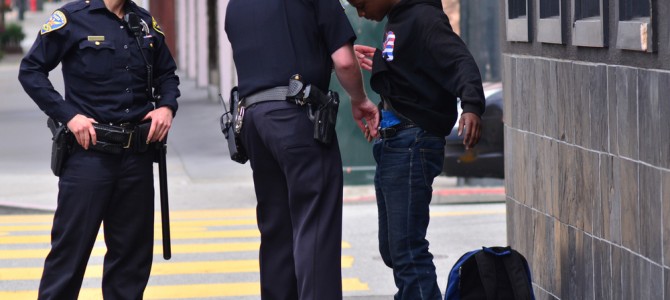
Language shapes thought, so of course now no linguistic matter is too small to evaluate for sufficient progressive bona fides (and signaling value). Recently, some frustrated San Franciscans learned this lesson the hard way when online commenters took them to task for daring to call thieves “criminals” on a popular website established to help neighbors get and stay in touch with each other in our increasingly socially fragmented world.
But they were in the right. You can call a thief a “criminal.” In fact, you should. Norms of behavior, even roughly applied to strangers, are indispensable to social life.
To make a long and ridiculous story very short, an online discussion of neighborhood crime amongst residents of Noe Valley and Glen Park in San Francisco hit the rocks when a resident suggested that, instead of calling local thieves “criminals,” others should refer to them as, for instance, “the person who stole my bike.” This turn of phrase, Malkia Cyril argued, will help re-humanize the discussion of local problems without disparaging members of the community who just so happen to be disobeying basic social rules.
To be sure, not everyone agreed with Cyril (who is no stranger to social activism and works as the executive director of the Center for Media Justice). But her don’t-call-a-thief-a-criminal position definitely garnered 61 “likes” and a variety of approving to jaw-dropping responses (“We must look at ourselves and our values and do what we can to create community, not just worry about our own ‘security’”).
If You Can’t Help Yourself, We Will
If this linguistic policing of law-abiding people (and reticence to actually police non-law-abiding people) strikes you as absurd, well, it absolutely should. If and when “microaggressions” are real, they harm the innocent, not the guilty. People who object to calling a thief a “criminal” basically place themselves on the worse side of a two-horned dilemma regarding their view of the, uh, entrepreneurs in question.
If the criminals genuinely, literally cannot help but commit more crime (because inequality rose, or they use drugs, or whatever), then they are not the types of agents who bear responsibility for their actions. They may deserve our sympathies and help, but this should affect the forms those will take—forms that won’t thrill the same social-justice activists who insisted the criminals are passive victims in the first place.
A lack of agency means the solution for these people who steal bikes is, perhaps, compulsory health care or institutionalization. Beings without agency can be treated kindly, but since they are not engaged in deliberate choice-making, they cannot give or withhold consent to conditions that affect them in a fully human fashion. Paternalism is therefore in order.
The alternative is to continue to see most (probably not all) criminals as persons in the full moral sense, as moral agents who make their own autonomous choices and are therefore responsible for their actions. But to ascribe moral personhood to someone isn’t just a feel-good phrase: moral personhood has implications for praise, blame, and how to include a being in our moral fold.
Moral persons must own up to the ways they’ve betrayed a community’s trust, and they must choose to act in ways that re-establish them as community members in good standing. This means no stealing (other than through the ordinary tax collector-sanctioned channels).
We Can’t Have Community If You’re Victimizing Me
San Francisco has a growing crime problem, which makes Cyril’s fantasyland proposal more threatening than laughable. In the real world, rather than providing a profound moment for dialogue and healing, crime simply begets more crime. It is not possible to put “creating community” before ensuring security. Instead, the latter is a condition of the former.
Even theorists of restorative justice recognize that forgiveness and abridged punishment aimed at restoring community (rather than meting out retribution) require more truthfulness and accountability from perpetrators, not less. Garden-variety social-justice enthusiasts make a mockery of this legitimate philosophy when they suggest that literally nothing is required from perpetrators of crime—not stopping, not confessing, not making restitution—and that the entire material burden of recreating community falls on everyone else.
There are some times and places when it makes sense to tread lightly on labeling criminals. Journalists and lawyers, for instance, are obligated to refrain from prematurely identifying the accused as proven guilty. These are appropriate norms of professional speech, but they do not bind the rest of us in our ordinary lives.
I saw a man pushing a shopping cart stacked with bicycles moseying through my South of Market neighborhood here in San Francisco at 4 a.m. last night. It simply defies logic to resist mentally categorizing him as a thief.
There are benefits to living in areas too dense to know everyone, but there are certain limitations, too. For example, you can’t behave as if you are a threat to people’s property and persons without being labeled as such by strangers. Maybe in a smaller town we’d know more about my block bike collector’s extenuating circumstances, such as either his lifelong struggle with mental illness or his serious lack of cashflow for heroin. But for urban life to remain at all workable, we need strong norms of public behavior and the attendant social pressures of calling a spade a spade.









